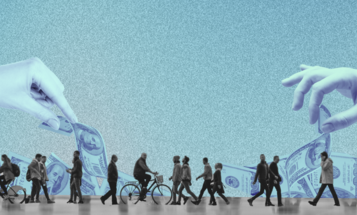
Pay Attention: The House of Representatives Is Advancing Economic Justice
In the last ten days, the House has passed two much-needed bills for Black and brown people and working people of all backgrounds. The PRO Act, is the most far-reaching reshaping of U.S. labor law in decades. The CREDIT Act would overhaul the nation’s credit reporting system.

Amidst the storm of the Senate impeachment process and the drama of the Democratic primary, it’s easy to overlook the activity of the House of Representatives in the new year. Below the biggest headlines, the House is taking concrete action to improve the lives of working Americans, on the job and in the financial marketplace. And while Congress’ new bills would benefit working people of all backgrounds, they offer the greatest boost to Black and brown people, so many of whom have been organizing for the wages, benefits, and working conditions they deserve, and striving to build good credit when the deck is stacked against them by historic injustice.
On Thursday, the House passed the most far-reaching reshaping of U.S. labor law in decades, the Protecting the Right to Organize (PRO) Act, sponsored by Representative Bobby Scott. The bill would enable working people to build more power in an economy dominated by corporations and CEOs. Specifically, the PRO Act would eliminate states’ anti-worker “right-to-work” laws that are rooted in efforts to cut wages and solidify racial divisions among workers in the Jim Crow South, enforce new penalties on employers who retaliate against workers joining together in unions, crack down on worker misclassification as independent contractors, prohibit employers from permanently replacing workers who go out on strike, and institute new rules so employers cannot endlessly delay negotiating with workers, among other provisions.
As Demos President K. Sabeel Rahman argued:
When working people bridge racial divisions and stand together for their fair share of the wealth they create, their union can be a powerful force for both racial and economic equity. That’s why corporate interests have constantly manipulated racism to turn working people against each other, pushing down wages, undermining solidarity, and weakening workers’ freedom to join together.
The evidence is also clear that strong unions boost voter turnout and lead to greater civic engagement by working people of all races and backgrounds. By empowering working people, the PRO Act will be a powerful check on corporate power in both our economy and our democracy.
Because unions negotiate fair hiring, promotion, and compensation practices and fight for members who face discrimination, unions reduce racial pay inequality, boosting the wages of Black, Latinx, and Asian union members closer to the pay rates typical of white workers. Women of color see some of the greatest benefits of unionization.
As vital as the reforms of the PRO Act would be, a deeper transformation of labor law is needed to truly shift power on the job to working people. Demos was a key contributor to Harvard Law School’s Clean Slate for Worker Power project advocating for structural changes such as electing workers to corporate boards and empowering workers to negotiate with employers across entire industries. Clean Slate proposals could build on PRO Act reforms.
In addition to pro-worker legislation, the House is acting to prevent injustice toward consumers. Last week, the House passed legislation to overhaul the nation’s credit reporting system, setting tough new standards for the private companies that act as financial gatekeepers by issuing credit reports and scores that determine who can get a home loan, how much interest we’ll pay on a credit card, what our car insurance will cost, and sometimes even whether we can land a job. The Comprehensive Credit Reporting Enhancement, Disclosure, Innovation, and Transparency (CREDIT) Act, sponsored by Representative Ayanna Pressley, would enact reforms Demos has advocated for nearly a decade, including narrowly restricting the use of credit checks in hiring and employment, addressing the sky-high error rate on credit reports, and limiting the prevalence of medical debt on credit reports, among other provisions. The bill would also establish a credit rehabilitation process for private student loan borrowers who are struggling.
Black and brown consumers have the greatest need for credit reporting reforms because generations of discrimination in employment, lending, education, and housing have produced significant racial disparities in credit history. Past discrimination is baked into current determinations of creditworthiness: Credit scores and other lending algorithms disproportionately represent Black and Latinx loan applicants as “riskier” customers who are charged more for credit. Black and Latinx consumers report more errors on their credit reports, carry more medical debt, and Black families in particular face greater hardships as a result of student loan debt.
Like the PRO Act, the Comprehensive CREDIT Act does not capture the full scope of transformative change. Demos makes the case for entirely replacing the nation’s failed for-profit credit reporting system with a public credit registry; while the Comprehensive CREDIT Act includes needed reforms of the existing system, it falls short of achieving the equity and fairness a public system would produce. Provisions offering relief for student borrowers, while valuable, also fall short of the Demos agenda for bold student loan cancellation and reform. Yet by reining in the worst abuses of the credit reporting industry, the bill is a major step forward.
The PRO Act and Comprehensive CREDIT Act are pragmatic, common-sense steps to rebalance power and improve people’s lives. Practical as they are, neither is likely to pass the Republican-dominated Senate, much less be signed into law by Donald Trump. Instead, these bills demonstrate that progressives are on the side of working people and people of color. They represent the incremental steps progressives might take in a governing moment, building power to achieve the full scope of transformative change needed to achieve racial and economic justice.




